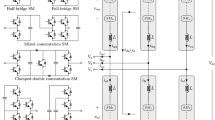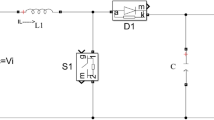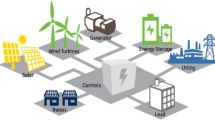Abstract
Power systems management has become a big challenge for the Transmission System Operator, especially after a large scale Renewable Energy Sources (RES) integration. In fact, research studies are much less concerned with increasing the power conversion efficiency for RES; their main concern today is rather to comply with the most restrictive grid codes. Indeed, the Maximum Power Point Tracking (MPPT) controller is no longer the priority for power systems dominated by RES. In this paper, the Adaptive Power Point Tracking (APPT) controller is proposed in order to meet restrictive power system requirements while optimizing the RES efficiency. It aims to ensure two main operation modes: (i) adjusting the RES output power during over-frequency events in order to ensure the Fast Frequency Response requirement, and (ii) maximizing the RES output power during normal conditions, which is equivalent to the MPPT operation mode. In this paper, The APPT controller is applied to Doubly-Fed-Induction-Generator based Wind Turbine. However, this controller can be applied to all the RES that are showing a maximum power point for certain parameters and operating conditions. The controller’s operation and performance are evaluated using MATLAB/Simulink environment.
















Similar content being viewed by others
Data Availability
Not applicable to this article.
Abbreviations
- APPT:
-
Adaptive power point tracking
- FFR:
-
Fast frequency response
- TSO:
-
Transmission system operator
- RSO:
-
Reference speed optimizer
- ROCOF:
-
Rate of change of frequency
- MPPT:
-
Maximum power point tracking
- RES:
-
Renewable energy sources
- WT:
-
Wind turbine
References
Scaling up variable renewable power: The role of grid codes. Report, International Renewable Energy Agency (2016)
Global energy transformation :a roadmap to 2050, Report, International Renewable Energy Agency (2018)
Abolhasani Jabali, M., Kazemi, M.H.: Estimation of inertia constant of Iran power grid using the largest simulation model and pmu data, in: 2016 24th Iranian Conference on Electrical Engineering (ICEE), 2016, pp. 158–160
Shamirzaee, M., Ayoubzadeh, H., Farokhzad, D., Aminifar, F., Haeri, H.: An improved method for estimation of inertia constant of power system based on polynomial approximation, in. Smart Grid Conference (SGC) 2014, 1–7 (2014). https://doi.org/10.1109/SGC.2014.7090867
Hong, Q., Asif Uddin Khan, M., Henderson, C., Egea-Àlvarez, A., Tzelepis, D., Booth, C.: Addressing frequency control challenges in future low-inertia power systems: A great britain perspective. Engineering (2021). https://doi.org/10.1016/j.eng.2021.06.005
Ratnam, K.S., Palanisamy, K., Yang, G.: Future low-inertia power systems: Requirements, issues, and solutions—a review. Renew Sustain Energy Rev 124, 109773 (2020). https://doi.org/10.1016/j.rser.2020.109773
Hong, Q., Nedd, M., Norris, S., Abdulhadi, I., Karimi, M., Terzija, V., Marshall, B., Bell, K., Booth, C.: Fast frequency response for effective frequency control in power systems with low inertia. J Eng 2019(16), 1696–1702 (2019)
Merino, J., Veganzones, C., Mendoza-Araya, P.: State of the art and future trends in grid codes applicable to isolated electrical systems. Energies 7, 7936–7954 (2014). https://doi.org/10.3390/en7127936
Demirol, M., Çaǧlar, R., Demirol, T.N.: Wind farm dynamic analysis in terms of turkish grid codes, in. International Conference on Probabilistic Methods Applied to Power Systems (PMAPS) 2016, 1–9 (2016)
Sewchurran, S., Davidson, I. E.: Introduction to the south african renewable energy grid code version 2.9 requirements (part ii - grid code technical requirements), in: 2017 IEEE AFRICON, (2017), pp. 1225–1230
Saeed, M.A., Khan, H.M., Ashraf, A., Qureshi, S.A.: Analyzing effectiveness of lvrt techniques for dfig wind turbine system and implementation of hybrid combination with control schemes. Renew. Sustain. Energy Rev. 81, 2487–2501 (2018)
El Fadili, A., Boutahar, S., Drhorhi, I., Stitou, M. Lajouad, R., Magri, A. E., Kheddioui, E.: Reference speed optimizer controller for maximum power tracking in wind energy conversion system involving dfig, in: 2018 Renewable Energies, Power Systems Green Inclusive Economy (REPS-GIE), 2018, pp. 1–6
El Magri, A., Giri, F., Besançon, G., Fadili, A.E., Dugard, L., Chaoui, F.: Sensorless adaptive output feedback control of wind energy systems with pms generators. Control Eng. Pract. 21(4), 530–543 (2013)
Lajouad, R., El Magri, A., El Fadili, A., Chaoui, F., Giri, F.: Adaptive nonlinear control of wind energy conversion system involving induction generator. Asian J. Control 17(4), 1934–6093 (2015)
Zou, Y., Elbuluk, M., Sozer, Y.: Stability analysis of maximum power point tracking (mppt) method in wind power systems. IEEE Ind. Appl. Soc. Annual Meet. 2011, 1–8 (2011). https://doi.org/10.1109/IAS.2011.6074308
Fathi, M., Parian, J.A.: Intelligent mppt for photovoltaic panels using a novel fuzzy logic and artificial neural networks based on evolutionary algorithms. Energy Rep. 7, 1338–1348 (2021). https://doi.org/10.1016/j.egyr.2021.02.051
Borni, A., Abdelkrim, T., Bouarroudj, N., Bouchakour, A., Zaghba, L., Lakhdari, A., Zarour, L.: Optimized mppt controllers using ga for grid connected photovoltaic systems, comparative study, Energy Procedia 119 (2017) 278–296, international Conference on Technologies and Materials for Renewable Energy, Environment and Sustainability, TMREES17, 21-24 April 2017, Beirut Lebanon. doi:https://doi.org/10.1016/j.egypro.2017.07.084
Yatimi, H., Aroudam, E.: Mppt algorithms based modeling and control for photovoltaic system under variable climatic conditions, Procedia Manufacturing 22 (2018) 757–764, 11th International Conference Interdisciplinarity in Engineering, INTER-ENG 2017, 5-6 October 2017, Tirgu Mures, Romania. https://doi.org/10.1016/j.promfg.2018.03.108
Wilches-Bernal, F., Chow, J.H., Sanchez-Gasca, J.J.: A fundamental study of applying wind turbines for power system frequency control. IEEE Trans. Power Syst. 31(2), 1496–1505 (2016). https://doi.org/10.1109/TPWRS.2015.2433932
Cheng, Y., Azizipanah-Abarghooee, R., Azizi, S., Ding, L., Terzija, V.: Smart frequency control in low inertia energy systems based on frequency response techniques: A review. Appl. Energy 279, 115798 (2020). https://doi.org/10.1016/j.apenergy.2020.115798
Vidyanandan, K.V., Senroy, N.: Primary frequency regulation by deloaded wind turbines using variable droop. IEEE Trans. Power Syst. 28(2), 837–846 (2013). https://doi.org/10.1109/TPWRS.2012.2208233
Morren, J., de Haan, S.W.H., Kling, W.L., Ferreira, J.A.: Wind turbines emulating inertia and supporting primary frequency control. IEEE Trans. Power Syst. 21(1), 433–434 (2006)
Ochoa, D., Martinez, S.: Fast-frequency response provided by dfig-wind turbines and its impact on the grid. IEEE Trans. Power Syst. 32(5), 4002–4011 (2017)
Wu, Z., Gao, W., Gao, T., Yan, W., Zhang, H., Yan, S., Wang, X.: State-of-the-art review on frequency response of wind power plants in power systems. J. Modern Power Syst. Clean Energy 6, 1–16 (2018). https://doi.org/10.1007/s40565-017-0315-y
Venne, P., Guillaud, X.: Impact of wind turbine controller strategy on deloaded operation, in. CIGRE/IEEE PES Joint Symposium Integration of Wide-Scale Renewable Resources Into the Power Delivery System 2009, 1–1 (2009)
Sun, L., Hou, Y., Peng, C., Hu, J.: Comparative studies on frequency responses of type 3 wind turbines and synchronous generators. IEEE Power Energy Soc. General Meeting 2017, 1–5 (2017)
Ma, H., Chowdhury, B.: Working towards frequency regulation with wind plants: combined control approaches. IET Renew. Power Gen. 4(4), 308–316 (2010). https://doi.org/10.1049/iet-rpg.2009.0100
Drhorhi, I., El Fadili, A., Berrahal, C., Lajouad, R., El Magri, A., Taher Azar, A., Vaidyanathan, S.: Adaptive backstepping controller for DFIG-based wind energy conversion system. Academic Press, Elsevier, 2020, pp. 235–260
Lang, Y., Zargari, N., Kouro, S.: Power conversion and control of wind energy systems. IEEE, WILEY (2011)
Jadhav, H.: A comprehensive review on the grid integration of doubly fed induction generator. Int. J. Electr. Power Energy Syst. 49(1), 8–18 (2013)
Kazmi, R., Goto, H., Hai-Jiao, G., Ichinokura, O.: A novel algorithm for fast and efficient speed-sensorless maximum power point tracking in wind energy conversion systems. IEEE Trans. Ind. Electron. 58(1), 29–36 (2011)
El Fadili, A., Giri, F., Magri, A.E.: Control models for induction motors, pp. 15–40. John Wiley & Sons Ltd, New York (2013)
Giri, F.: AC electric motors control: advanced design techniques and applications. Wiley & Sons, New York (2013)
El Fadili, A., Giri, F., Magri, A.E., Dugard, L., Ouadi, H.: Induction motor control in presence of magnetic saturation: Speed regulation and power factor correction, in: Proceedings of the 2011 American Control Conference, 2011, pp. 5406–5411
Drhorhi, I., Fadili, A.E., Kasmi, D.E., Stitou, M.: Evaluation of the moroccan electrical grid dynamic stability after large scale renewable energies integration, in: 2018 Renewable Energies, Power Systems Green Inclusive Economy (REPS-GIE), 2018, pp. 1–5
Author information
Authors and Affiliations
Corresponding author
Additional information
Publisher's Note
Springer Nature remains neutral with regard to jurisdictional claims in published maps and institutional affiliations.
Rights and permissions
Springer Nature or its licensor (e.g. a society or other partner) holds exclusive rights to this article under a publishing agreement with the author(s) or other rightsholder(s); author self-archiving of the accepted manuscript version of this article is solely governed by the terms of such publishing agreement and applicable law.
About this article
Cite this article
Drhorhi, I., El Fadili, A. Adaptive power point tracking to meet restrictive electrical grid requirements. Energy Syst (2023). https://doi.org/10.1007/s12667-023-00567-2
Received:
Accepted:
Published:
DOI: https://doi.org/10.1007/s12667-023-00567-2




